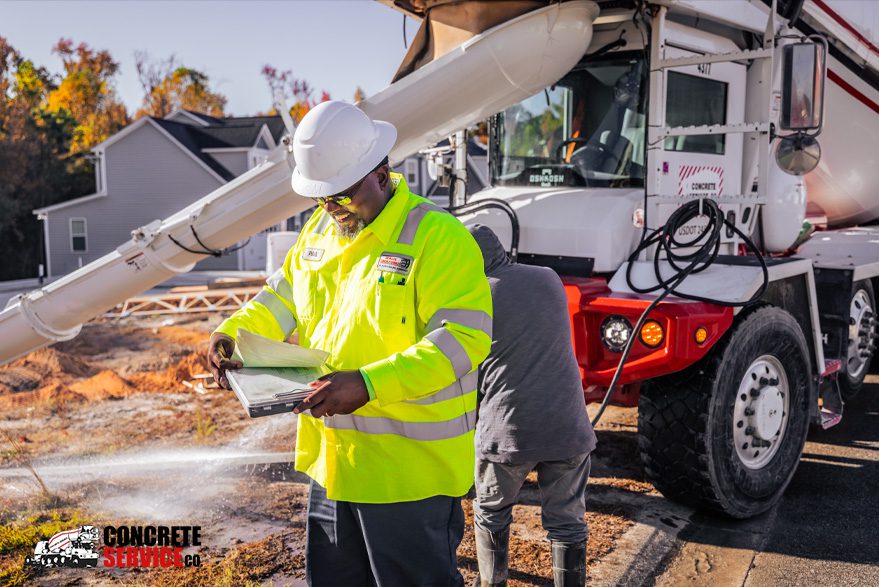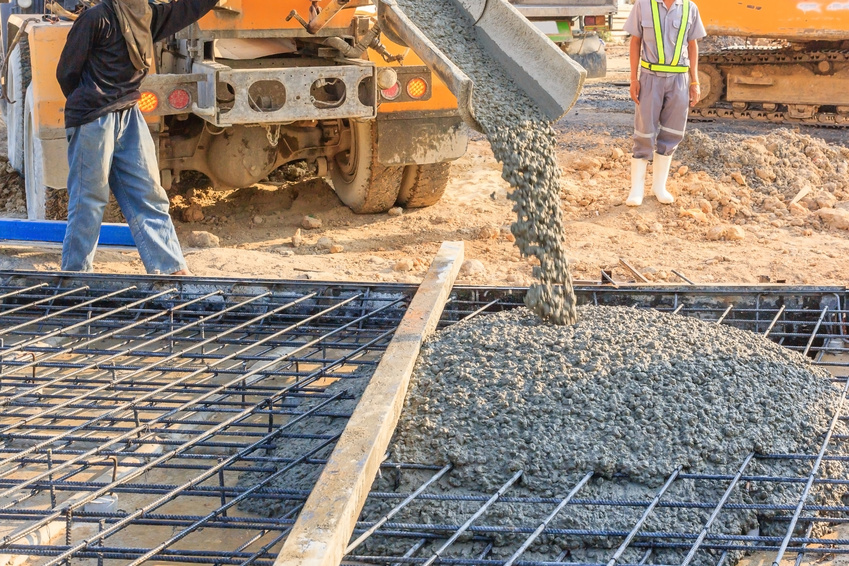
Recognizing the Important Duty of a Concrete Professional in Modern Building and Layout
Concrete specialists are necessary to the building and design sectors. Their expertise guarantees that frameworks are not only resilient yet also aesthetically pleasing. They participate in numerous responsibilities, from task intending to quality assurance, and work together with architects and designers. With developing technologies and trends, their role is more vital than ever before. Recognizing their effect can expose understandings into contemporary building techniques and the future of structure layout.
The Relevance of Concrete in Building and construction
Various products are utilized in construction, concrete continues to be a cornerstone of modern-day building techniques due to its stamina, flexibility, and sturdiness. This composite material, made from concrete, water, and aggregates, can endure considerable tension and is immune to fire, weather, and bugs, making it ideal for diverse applications. Concrete's versatility allows it to be formed right into numerous forms and sizes, helping with innovative building styles.
Its thermal mass buildings add to energy effectiveness, helping to regulate interior temperatures. The prevalent accessibility of raw materials and the fairly inexpensive of concrete also enhance its appeal for massive tasks, from industrial buildings to infrastructure like roadways and bridges. As urbanization remains to rise, the demand for sustainable and reliable building products strengthens concrete's essential duty in building and construction, making it a fundamental option for designers and home builders intending for long life and strength in their projects.
Trick Responsibilities of a Concrete Contractor
Concrete contractors play a crucial function in the construction procedure, with a number of key responsibilities that ensure task success. Their tasks consist of task preparation and style, product choice and administration, as well as keeping quality assurance and guarantee throughout the project lifecycle. Comprehending these duties is important for appreciating the contractor's influence on building results.
Task Planning and Design
When starting on a building task, efficient task preparation and layout play an important function in a concrete service provider's responsibilities. The service provider should team up carefully with engineers, customers, and engineers to understand the task's specifications and goals. This includes reviewing site conditions, examining layout needs, and figuring out the extent of work. A concrete service provider is additionally in charge of establishing budgets and timelines, guaranteeing that all phases of the project align with total purposes. Furthermore, they must prepare for possible challenges and devise remedies to keep project effectiveness. By diligently designing each aspect and intending of the concrete work, the service provider establishes the foundation for effective execution, making sure structural stability and adherence to security requirements throughout the building procedure.
Material Selection and Management
Reliable material selection and management are important responsibilities for a concrete specialist, as these choices straight influence the top quality and sturdiness of the last structure. Concrete professionals must examine numerous materials, consisting of aggregates, admixtures, and support types, to ensure they fulfill task specs and environmental problems. They must take into consideration variables such as workability, resistance, and toughness to weathering. Furthermore, managing the supply chain is crucial, as timely delivery of materials can incredibly influence job timelines. Service providers should maintain partnerships with providers to safeguard premium resources while additionally keeping track of stock degrees to prevent extras or shortages. Inevitably, this careful option and management of materials add to the general success of building and construction jobs and the durability of the structures built.
Quality Assurance and Guarantee
Quality assurance and assurance are vital in the building market, particularly for concrete professionals entrusted with providing trusted and resilient structures. Concrete contractors should apply strenuous quality assurance procedures throughout the building process, guaranteeing that all materials fulfill defined guidelines and standards (Concrete Contractor Near Me). This consists of keeping track of the mixing, putting, and treating processes to stop problems and boost structural honesty. Regular inspections are vital, permitting professionals to recognize and rectify issues without delay. In addition, concrete service providers often work together with engineers and architects to ensure that the end product straightens with design specs. By adhering to stringent quality control protocols, concrete service providers not just protect the longevity of their job yet likewise copyright the depend on of clients and stakeholders in the construction market
Sorts Of Projects Managed by Concrete Contractors
Concrete specialists are typically linked with massive construction tasks, their know-how prolongs to a varied variety of applications. These experts are indispensable to household tasks, such as patio areas, driveways, and structures, ensuring longevity and visual charm. In industrial construction, they contribute to the production of floorings, walkways, and architectural elements that meet certain design and safety criteria.
Furthermore, concrete service providers are entailed in infrastructure jobs, consisting of bridges, roads, and tunnels, where their abilities guarantee structural stability and longevity. They likewise play an essential function in decorative concrete applications, such as stamped concrete and polished surfaces, which boost the appearance of numerous spaces. Furthermore, their solutions reach fix and maintenance work, attending to concerns like splitting or erosion in existing structures. This convenience highlights the important role concrete service providers play in both functional and decorative elements of contemporary construction and layout.
Certifications and abilities Needed
Concrete website specialists must possess a diverse set of abilities and qualifications to effectively take care of the variety of jobs they undertake. Efficiency in concrete blending, pouring, and finishing is important, as is a solid understanding of numerous kinds of concrete, including strengthened and ornamental choices. Expertise of building and construction methods, blueprints, and project management concepts is critical for effective execution.
Additionally, physical stamina and toughness are essential because of the requiring nature of the work. Specialists ought to additionally have solid analytical capabilities to resolve unforeseen obstacles throughout projects. Interaction abilities are vital for collaborating with clients, architects, and other tradespeople.
In addition, obtaining relevant accreditations can boost a contractor's reputation and broaden their career possibilities. Constant education and learning in new strategies and materials maintains service providers affordable in a swiftly advancing industry. These certifications and skills collectively make it possible for concrete professionals to deliver high-grade outcomes efficiently and properly.
The Function of Concrete Professionals in Security Compliance
Guaranteeing safety compliance is an essential obligation of concrete specialists, as they browse the complexities of construction websites. These professionals are entrusted with adhering to rigorous security policies and criteria, which are critical for stopping mishaps and making sure the health of all site workers. TJ Concrete Contractor. Concrete service providers should carry out complete safety and security strategies that consist of training workers on appropriate tools use and safety and security methods
Additionally, they are in charge of examining materials and job processes to recognize possible threats. By conducting regular security audits and risk evaluations, concrete contractors can proactively resolve problems prior to they intensify. Moreover, they team up with various other building specialists, such as designers and job managers, to integrate security measures into the overall task strategy. Inevitably, the commitment of concrete specialists to safety and security conformity not only secures employees however additionally improves job effectiveness and top quality, enhancing their important function in modern construction.
Trends and Developments in Concrete Design
Current innovations in concrete design have presented a variety of patterns and technologies that prioritize sustainability and looks. Sustainable concrete services, ornamental ending up methods, and wise concrete technologies are improving the sector. These advancements not only enhance structural stability but also add to environmentally accountable construction techniques.
Sustainable Concrete Solutions
As the building sector increasingly focuses on sustainability, cutting-edge concrete solutions are emerging to lower environmental impact while boosting performance. One prominent fad is using recycled products, such as smashed concrete and commercial results, which not just lowers waste yet additionally boosts the concrete's properties. Additionally, developments in admixtures, consisting of fly ash and slag, add to decreased carbon emissions during production. Another substantial innovation includes the growth of absorptive concrete, which allows water to stream through and minimizes runoff, reducing flooding and groundwater deficiency. In addition, the surge of carbon capture innovations in concrete production holds guarantee for more emissions reduction. These sustainable concrete remedies exhibit the market's commitment to environmentally liable construction methods.

Decorative Completing Techniques
A huge selection of decorative completing methods have arised in concrete design, changing plain surfaces into visually striking aspects. Techniques such as stamping, discoloration, and brightening enable a vast array of aesthetic possibilities, dealing with varied design choices. Stamped concrete mimics all-natural products like rock and block, while discoloring presents vivid shades that improve the surface area's charm. Sleek concrete, understood for its sleek coating, includes sophistication to both business and household rooms. In addition, microtopping and overlay systems provide innovative options for renewing existing concrete. These strategies not just boost the aesthetic qualities however additionally improve longevity and upkeep. As trends develop, the combination of ornamental surfaces proceeds to play an essential duty in modern-day building, marrying performance with imaginative expression.

Smart Concrete Technologies
While standard concrete remains a staple in building, the emergence of clever concrete innovations is changing the industry by integrating innovative attributes that boost performance and sustainability. These advancements consist of self-healing concrete, which makes use of ingrained germs that trigger upon splitting, and sensor-equipped concrete that monitors structural health in real-time. Additionally, piezoelectric and thermochromic concrete can adapt to ecological changes and produce power, respectively. The implementation of recycled materials and environmentally friendly ingredients likewise adds to decreasing the carbon impact of concrete production. As these innovations remain to evolve, they guarantee to improve longevity, lower maintenance prices, and advertise greener building techniques, making them essential for future building and construction projects. The function of concrete professionals is significantly considerable in using these advancements.
Often Asked Concerns
What Variables Influence Concrete Pricing in Building And Construction Projects?
Concrete prices in building jobs is affected by product expenses, labor expenditures, project size, place, schedule of sources, and market demand. Seasonal elements and transport costs can additionally considerably impact the general rates framework.
Exactly How Do Climate Condition Affect Concrete Work?
Weather significantly affect concrete work; extreme temperature levels, moisture, and rainfall can affect establishing times, healing procedures, and total top quality - Concrete Contractor Near Me. Specialists have to adjust their approaches and timetables to alleviate these ecological influences for effective task completion
What Is the Common Timeline for a Concrete Project?
A typical concrete task timeline varies from a few days to several weeks. Variables affecting this duration include project dimension, intricacy, climate condition, and treating times, which jointly figure out the general completion schedule.
Can Concrete Service Providers Aid With Layout Consultations?
Concrete contractors can certainly help with design assessments, supplying useful insights on material selection, architectural honesty, and visual alternatives, guaranteeing that jobs satisfy both functional needs and the customer's vision for the finished item.
What Prevail False Impressions Concerning Concrete Durability?
Usual mistaken beliefs regarding concrete longevity consist of the belief that it is impervious to damage which all types are equally strong. In truth, factors like mix style, ecological conditions, and upkeep greatly influence concrete's lasting performance.
They likewise play a critical duty in decorative concrete applications, such as stamped concrete and sleek surfaces, which improve the aesthetic facet of various areas. Efficiency in concrete blending, putting, and finishing is crucial, as is a solid understanding of numerous types of concrete, consisting of reinforced and ornamental choices. One noticeable pattern is the usage of recycled products, such as smashed concrete and industrial byproducts, which not only lowers waste but likewise enhances the concrete's homes. While typical concrete remains a staple in building, the introduction of clever concrete technologies is transforming the market by incorporating innovative features that improve efficiency and sustainability. These developments include self-healing concrete, which makes use of ingrained bacteria that trigger upon breaking, and sensor-equipped concrete that monitors architectural health and wellness in real-time.